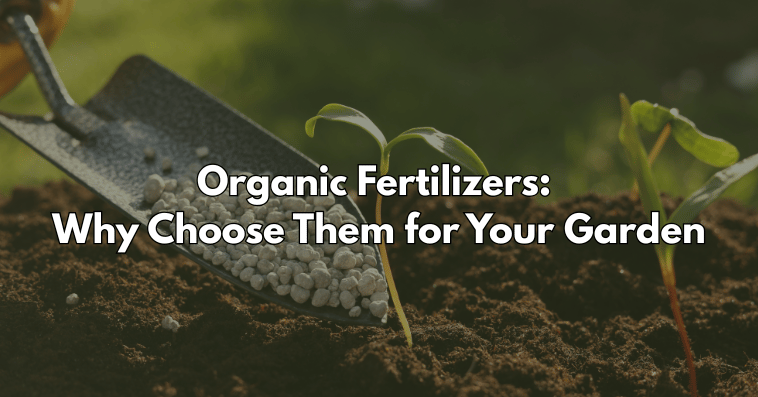In recent years, more and more home gardeners, plant enthusiasts, and sustainable farmers are turning to organic fertilizers as a natural solution for growing healthy, thriving plants. With a rising awareness of environmental health and the need for chemical-free food production, the use of organic fertilizers has become a powerful trend in gardening — and for good reason.
Whether you're a seasoned gardener or just beginning your plant journey, choosing the right fertilizer can make all the difference. In this blog, we’ll explore why organic fertilizers are the best choice for your garden, how they benefit the soil and plants, and how you can get started with them today.
What Are Organic Fertilizers?
Organic fertilizers are derived from natural sources such as plant matter, animal waste, compost, bone meal, and seaweed. Unlike chemical or synthetic fertilizers, which are manufactured using industrial processes and can contain harmful residues, organic fertilizers are biodegradable, eco-friendly, and safe for both plants and the environment.
They don’t just feed the plant—they enrich the soil, improve microbial activity, and create a thriving ecosystem that supports plant health from the roots up.
Top Benefits of Organic Fertilizers
1. 🌿 Soil Health Improvement
Organic fertilizers improve soil texture, aeration, and water retention. Over time, they increase the organic matter in the soil, which promotes beneficial microbial growth and healthy root development. This leads to long-term fertility and stronger plants.
2. 🌍 Environmentally Friendly
Using organic fertilizers helps reduce chemical runoff, which often pollutes rivers and groundwater. Since they are made from natural biodegradable materials, they have a low carbon footprint and contribute to a cleaner, greener planet.
3. 🌱 Slow and Steady Nutrient Release
Unlike chemical fertilizers that give a sudden spike of nutrients, organic fertilizers release nutrients slowly, ensuring that plants absorb them over time. This reduces the risk of root burn and supports sustained plant growth.
4. 🐞 Boosts Soil Microbial Activity
Organic fertilizers create a microbe-friendly environment that supports earthworms, fungi, and bacteria essential for nutrient cycling. This natural synergy between plants and soil life results in better resistance to diseases and pests.
5. 🍅 Chemical-Free and Safe for Edible Plants
If you grow your own vegetables, fruits, or herbs, using organic fertilizers ensures that no harmful chemicals end up in your food. This is especially important for home gardeners who want clean, fresh produce.
6. 💰 Cost-Effective in the Long Run
Though organic fertilizers might seem slightly expensive initially, their long-term benefits far outweigh the cost. By enhancing soil fertility naturally, you’ll need fewer inputs over time and enjoy better harvests year after year.
Types of Organic Fertilizers You Can Use
-
Compost: Made from decomposed kitchen and garden waste, compost is rich in nutrients and perfect for all types of plants.
-
Vermicompost: Made using earthworms, it’s highly effective in improving soil structure and nutrient availability.
-
Cow Dung Manure: A traditional and readily available fertilizer for Indian gardens, especially effective in flowering plants.
-
Bone Meal: A source of phosphorus, ideal for root development and flowering.
-
Neem Cake: Acts as both a fertilizer and a pest repellent, perfect for organic vegetable gardening.
-
Seaweed Extract: Boosts plant immunity and promotes healthy foliage and blooms.
Chemical vs Organic Fertilizers: What’s the Real Difference?
| Feature | Organic Fertilizers | Chemical Fertilizers |
| Nutrient Release | Slow and natural | Quick, often too fast |
| Soil Impact | Improves soil quality | Can degrade soil over time |
| Environmental Impact | Eco-friendly and safe | May lead to pollution |
| Microbial Support | Boosts soil biodiversity | Harms beneficial microbes |
| Long-term Benefits | Sustainable and enriching | Short-term solution |
How to Use Organic Fertilizers in Your Garden
-
Prepare the Soil: Loosen the topsoil and remove any weeds or debris.
-
Choose the Right Fertilizer: Depending on your plant’s needs, pick the appropriate organic fertilizer (e.g., compost for leafy plants, bone meal for flowering).
-
Apply Evenly: Mix the fertilizer into the soil or sprinkle it around the plant base.
-
Water Generously: After applying fertilizer, water your plants thoroughly to help nutrients soak into the soil.
-
Repeat as Needed: Organic fertilizers can be used every 4-6 weeks depending on plant growth.
Pro Tip: Always read the label for application quantity and timing to avoid overfeeding.
Is Organic Fertilizer Enough for My Plants?
Absolutely! With the right organic fertilizers and good gardening practices—like adequate sunlight, proper watering, and timely pruning—your plants will grow healthier, stronger, and more resilient. Many Indian gardeners have already made the switch and are seeing lush, vibrant results.
Where to Buy the Best Organic Fertilizers Online in India?
Looking for trusted, high-quality organic fertilizers for your garden?
✅ Visit PaudheWale – your one-stop destination for all things gardening. Whether you’re searching for vermicompost, bone meal, neem cake, or organic plant boosters, PaudheWale has it all.
Their natural and sustainable gardening products are perfect for eco-conscious gardeners who want results without harming the environment.

